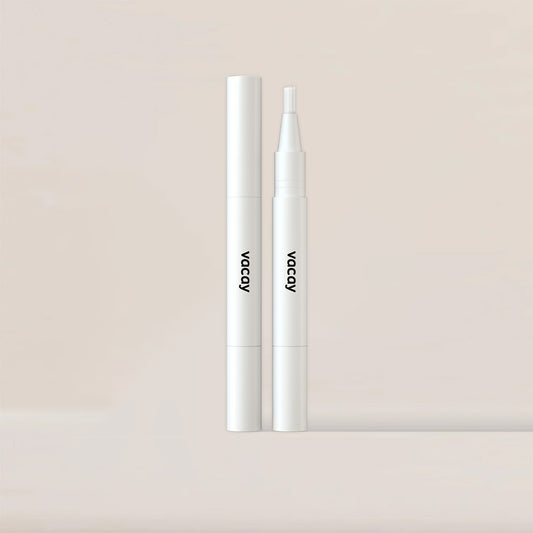
Does Whitening Teeth Make You Lose Weight?
We’re all about finding confidence-boosting rituals that make us feel good—from finally perfecting your skincare routine to hitting your stride at the gym. But one recent buzz-worthy question caught our attention: Can whitening your teeth help you lose weight?
We get it—there’s something about white teeth and a brighter smile that makes everything feel a little lighter. But is there any actual link between teeth whitening and dropping a few pounds? Let’s unpack what’s really going on here.
First Things First: What Is Teeth Whitening, Really?
Teeth whitening is exactly what it sounds like—a cosmetic treatment for tooth whitening that lightens and brightens your smile by reducing surface stains and discoloration. It can be done professionally at the dentist’s office or more affordably at home with whitening strips or pens.
The whitening process involves various methods, such as in-office treatments that utilize stronger peroxide solutions and at-home bleaching kits. These methods are designed to effectively remove stains and lighten teeth color.
The boost in confidence that often comes after a whitening session? Totally real. But that doesn’t mean it’s burning calories or revving your metabolism. (If only!)
Types of Teeth Whitening
There are several types of teeth whitening methods available. In-office treatments are known for their quick and dramatic results, often achieved in just one visit. These treatments typically use a stronger bleaching agent, which is applied by a dental professional to ensure safety and effectiveness.
At-home whitening kits, on the other hand, offer a more gradual whitening process. These kits usually contain a bleaching agent in the form of gels, pastes, or mouthguards, which can be used over a period of time to achieve desired results.
Benefits of In-Office Teeth Whitening
One of the main advantages of professional teeth whitening is the immediate and noticeable improvement in your smile. Additionally, maintaining good dental health through regular brushing, flossing, and professional check-ups can enhance the whitening results and prevent issues such as tooth discoloration and sensitivity.
Types of Teeth Whitening
When it comes to achieving a dazzling smile, there are several teeth whitening methods to consider. Each method offers unique benefits, so it’s essential to choose the one that best fits your needs and lifestyle.
In-office teeth whitening is a professional treatment performed at the dentist’s office. This method uses a high concentration of hydrogen peroxide or carbamide peroxide to whiten teeth quickly and effectively. The results are often immediate and can be quite dramatic, making it an excellent option for those seeking a fast transformation.
For those who prefer the convenience of home treatments, at-home teeth whitening kits are a popular choice. These kits typically contain a lower concentration of hydrogen peroxide or carbamide peroxide than in-office treatments, making them safe for home use. They can be an affordable and effective way to achieve a whiter smile over time.
Whitening toothpastes are another option for maintaining a bright smile. These toothpastes are gentle enough for daily use and can help scrub stains from the surface of your teeth, keeping them looking their best.
Teeth whitening strips are also widely used. These strips are coated with a peroxide-based gel and are applied to the teeth for a specified amount of time. They are easy to use and can provide noticeable results with consistent use.
Shop vacay whitening strips here.
No matter which method you choose, the key is to find a whitening solution that fits your lifestyle and helps you achieve the whiter smile you desire.
Benefits of In-Office Teeth Whitening
Opting for in-office teeth whitening comes with several compelling benefits that make it a standout choice for many.
Firstly, in-office teeth whitening offers faster results compared to at-home kits. The high concentration of hydrogen peroxide or carbamide peroxide used in professional treatments can remove deep stains and discoloration in just one session, leaving your teeth looking significantly whiter and brighter.
Another advantage is the personalized treatment plan you receive. A dentist can assess your specific needs and recommend the best teeth whitening method for you, ensuring that the treatment is both safe and effective. This personalized approach can lead to more satisfying and longer-lasting results.
While in-office treatments can be more expensive than at-home kits, the investment often pays off with dramatic and long-lasting results. Plus, these treatments can be combined with other dental procedures, such as dental implants or veneers, to achieve a comprehensive smile makeover.
In summary, in-office teeth whitening provides a professional, tailored approach to achieving a brighter smile, making it a worthwhile consideration for those seeking the best possible results.
Post-Care Recommendations
After undergoing a teeth whitening treatment, it’s crucial to follow post-care recommendations to maintain your results and prevent tooth sensitivity.
For at least 24 hours after your treatment, avoid consuming staining foods and drinks such as coffee, tea, and red wine. These can easily undo the whitening effects and lead to new stains.
Using a fluoride toothpaste and mouthwash can help strengthen your tooth enamel and reduce sensitivity. Fluoride helps to remineralize your teeth, making them more resistant to future stains and decay.
It’s also important to avoid using a toothbrush with hard bristles, as these can damage your tooth enamel and cause sensitivity. Opt for a soft-bristled toothbrush to gently clean your teeth without causing harm.
Lastly, make sure to attend regular dental check-ups. These visits are essential for maintaining good oral health and preventing new stains from forming. Your dentist can provide additional tips and guidance to help you keep your smile bright and healthy.
Protecting Your Teeth
Maintaining a whiter smile involves more than just whitening treatments; it also requires protecting your teeth from stains and discoloration.
One simple tip is to use a straw when consuming staining drinks like coffee or tea. This minimizes contact with your teeth and helps prevent stains from forming.
Chewing sugar-free gum after meals can also be beneficial. It stimulates saliva production, which helps neutralize acids and remineralize your teeth, keeping them healthy and less prone to staining.
Avoiding smoking and tobacco products is crucial, as these can cause significant staining and discoloration. Quitting smoking not only benefits your oral health but also your overall health.
Limiting your consumption of acidic foods and drinks, such as citrus fruits and soda, is also important. These can erode your tooth enamel, making your teeth more susceptible to stains and sensitivity.
By following these tips, you can help protect your teeth and maintain a whiter smile for longer.
So… Does Whitening Your Teeth Actually Help You Lose Weight?
Short answer: no, not directly.
Teeth whitening products don’t contain any magical ingredients that impact fat burning or appetite. But here’s where things get interesting—there’s a surprising psychological link between taking care of your smile and staying motivated with your health goals. Achieving a desirable body weight can be part of these health goals, providing a clear target for your efforts.
When you invest in self-care, whether it’s a fresh set of nails or a glowy smile, you’re more likely to stay consistent in other areas of your life. That includes eating better, moving your body, and making empowered choices daily. Setting specific weight loss goals can further enhance this motivation, helping you stay on track. Incorporating low calorie diets into your routine can also support these dietary practices, leading to sustainable weight management. In other words, whitening your teeth could be the spark that lights a bigger lifestyle shift—not the solution itself. Additionally, nonprofessional patient-led groups and counseling can effectively support weight loss efforts by providing low-cost solutions and ongoing support.
How Oral Health and Weight Are Quietly Connected
It might sound like a stretch, but your mouth and your waistline are more connected than you think. Studies show that poor oral health has been linked to inflammation in the body, which can play a role in weight gain and chronic illness. Protecting gum tissue during oral health routines is crucial to prevent irritation and maintain overall dental health. Additionally, the dental pellicle, a protective layer on your teeth, is removed during whitening treatments, making enamel more susceptible to staining for the first 24 to 48 hours.
Brushing and flossing regularly? That’s not just for fresh breath—it’s part of a bigger picture of wellness. Practicing good oral hygiene, including regular brushing and flossing, is essential for preventing tooth discoloration and enhancing the effectiveness of whitening treatments. So while whitening doesn’t slim your jeans, keeping your mouth healthy absolutely supports your body’s overall balance. Good oral hygiene practices, such as using fluoride toothpaste and drinking fluoridated water, significantly contribute to achieving and maintaining whiter teeth.
Importance of Regular Dental Check-Ups
Regular dental check-ups are a cornerstone of maintaining good oral health and a whiter smile.
During these visits, your dentist can provide personalized guidance on teeth whitening methods and recommend the best treatment plan for your individual needs. This ensures that you are using the most effective and safe whitening methods.
Regular check-ups also help prevent oral health issues such as gum disease and tooth decay, which can affect the appearance of your teeth. By catching these issues early, your dentist can help you maintain a healthier, whiter smile.
Your dentist can also offer advice on healthy eating habits and lifestyle changes that can support your oral health. This includes tips on foods to avoid and habits to adopt to keep your teeth looking their best.
In summary, regular dental check-ups are essential for identifying and addressing any oral health issues early on, ensuring a healthier, whiter smile.
The Real Keys to Healthy Weight Loss
If you’re here looking for sustainable, no-BS tips, we got you:
- Nutrition first. Think leafy greens, lean proteins, healthy fats, and foods that actually nourish you. Pay attention to your total calories to ensure you're not overeating. Incorporate whole grains into your meals for added nutrients and satiety. Don't forget to include plenty of fruits and vegetables to boost your fiber intake and overall health. A balanced diet is key to maintaining long-term health and weight management. Make informed food choices to support your dietary goals. Be mindful of certain foods, like high-fat options, and opt for lower-fat alternatives. High fiber foods can help you feel full longer and support digestive health. Adopting a low fat diet can also aid in weight loss and improve adherence to healthy eating practices.
- Move with joy. Find workouts that make you feel strong and energized—whether that’s hot yoga, long walks, or dance cardio in your living room. Regular physical activity is essential for balancing energy expenditure with caloric intake. Incorporate aerobic exercise to improve cardiovascular fitness and enhance weight loss results.
- Hydrate, always. Sometimes what feels like hunger is just your body asking for water.
- Ditch the all-or-nothing thinking. One “off” day doesn’t undo your progress. Show up again tomorrow.
The goal? Build habits that support how you want to feel, not just how you want to look.
Whiten for Confidence, Not for Calories
At the end of the day, your smile is yours—take care of it because it helps you feel radiant and confident. Whitening strips, pens, and treatments can be great tools in your beauty toolkit, but they’re not weight loss hacks (and they shouldn’t be). These methods can provide a noticeable whitening effect, helping to maintain the brightness of your smile over time. Additionally, the whitening results from these treatments can vary based on individual habits and lifestyle factors, but with proper care, they can be long-lasting. Achieving whiter teeth through these methods can significantly enhance your overall appearance.
Your wellness journey doesn’t need shortcuts—it needs you. Showing up. Being kind to yourself. And maybe smiling a little brighter along the way.
The Takeaway
Teeth whitening won’t make the number on the scale go down, but it can make you feel more confident—which is a powerful motivator in and of itself. While natural teeth typically have an off-white color, maintaining their health is more important than achieving a pure white smile. It's also crucial to consider dental restorations, as they do not change color with whitening treatments.
Some people use coconut oil for oil pulling, although its effectiveness for teeth whitening lacks strong scientific support. Additionally, certain medications can cause intrinsic discoloration that may not respond well to whitening.
Want to feel lighter? Start by showing yourself a little more love—whether that’s with a whitening treatment, a walk around the block, or a nourishing dinner made at home. Remember, dry mouth can be a side effect of some weight loss medications, so stay hydrated. High-protein, low-carbohydrate diets can help normalize insulin levels, which is beneficial for metabolic health.
Weight loss can also reduce the risk of heart disease and excess body fat. Incorporating moderate amounts of dairy and meat products into your diet can ensure you receive essential nutrients. Family dynamics can influence eating patterns, so seek support from loved ones. Consistent exercise and dietary changes are key to losing weight and maintaining it.
Because confidence isn’t measured in pounds. It’s felt in the way you show up for yourself, every day.




